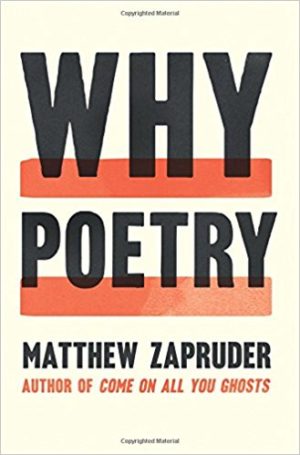Several books on the market instruct would-be poets how to write poems into their types – haiku, sonnet, ballad, limerick, and more. Other tomes deconstruct what makes classic poems great – the symbolism, metaphors, and so on. Matthew Zapruder, an award-winning poet, takes a different approach with Why Poetry. He’s all too familiar with students who say that they don’t understand or like poetry, that they feel disoriented when reading a poem. Zapruder argues that the sense of disorientation is exactly the point of poetry and the search for a more definite experience comes from teachers who overanalyze poems.
[alert variation=”alert-info”]Publisher: Ecco
Formats: Hardcover, Kindle
Purchase: Powell’s | Amazon | iBooks[/alert]
“I often say to my students – and it is still so funny and strange to me to think that I am no longer a student but am a teacher myself, because in my mind, especially in relation to poetry, I will always be one – that without clarity, it is not possible to have true mystery. By clarity, I mean a sense in the reader that what is being said on the surface of the poem is not a scrim or veil deliberately hiding some other hidden, inaccessible certainty. Clarity for me in poetry is a kind of generosity, a willingness to be together with the reader in the same place of uncertainty, striving for understanding. To give the impression that something more important is happening but that the mere reader cannot, without some kind of special, esoteric knowledge, have access to strikes me as deeply ungenerous, even cruel” (190).
This quotation gives a taste of the paragraphs, almost poetic in their own right, in Why Poetry. This collection of essays is largely based off real conversations Zapruder had with friends, family, and colleagues, and could be described as ruminations on the complex yet elusive nature of poetry. He looks at poetry as a whole, different subsets of poetry such as 1920s surrealism, and even specific poems. An entire chapter is devoted to John Ashbery’s poetry.
Zapruder’s descriptions of poetry match the way he writes his reflections. He does not attempt to definitively answer the question posed by the book title. Instead, he gives concrete examples to discuss the specific yet evasive, mysterious nature of poetry.
[signoff predefined=”Social Media Reminder” icon=”facebook”][/signoff]

